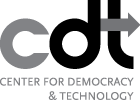Data & Civil Rights: Why "Big Data" is a Civil Rights Issue
This event has passed, materials from the conference available below.
On October 30, 2014, the Data & Society Research Institute, The Leadership Conference on Civil and Human Rights, and New America's Open Technology Institute hosted the first annual conference on Data & Civil Rights on October 30, 2014 at the Newseum in Washington, DC. This year's conference focused on why "big data" is a civil rights issue. The event convened a diverse group of people from the civil rights community, government, industry, philanthropy, and research. It was organized by Corrine Yu, Seeta Peña Gangadharan, and danah boyd.
This event built on the civil rights community's efforts in producing the Civil Rights Principles for the Era of Big Data and the lessons learned by the White House in their 2014 review of big data. The White House's report - "Big Data: Seizing Opportunities, Preserving Values - highlighted the need to better understand the potential for discrimination, inequality, and other civil rights issues. While technology-minded communities have considered the potential and challenges presented by "big data," these techniques and data practices affect more than the technology sector. Many issues central to the civil rights community – including criminal justice, education, employment, finance, health, and housing – are being affected by "big data" dynamics. In order to better understand what is at stake for our civil rights, we sparked a conversation that crossed sectors to identify a path forward. We wanted to better understand technology's potential and develop a grounded sense of where there are concerns and what we can do to prevent problems. This site offers documentation of the event, including written primers that attendees used during the event to explore key issues as well as write-ups of the discussions themselves. Please send any feedback or ideas to us at nextsteps at datacivilrights.org.Conference Schedule
-
9:30–10:00Welcome introduction from Corrine, Seeta, and danah
-
10:00–11:15Firestarters and Discussion, Current Civil Rights Issues
-
11:15–12:00Discussion, Key “Big Data” Technologies, moderated by Solon Barocas
-
12:00–1:15Lunch
-
1:15–3:00Workshops: criminal justice, education, employment, finance, health, and housing
-
3:15–4:15Breakouts: technology development, social change, government action, industry innovation, policy development, new research
-
4:15–5:00Closing discussion
Event Materials
-
Overview
-
Videos
-
Technology
-
Workshops
-
Breakouts
-
Extras
Partners and Sponsors
This conference is organized by the Data & Society Research Institute, The Leadership Conference on Civil and Human Rights, and New America's Open Technology Institute.We are grateful to have support from numerous partners and sponsors.
Partners:
Sponsors:
This event was made possible through the guidance and support of the Ford Foundation with additional funding and support by Bill & Melinda Gates Foundation, Robert Wood Johnson Foundation, the John S. and James L. Knight Foundation, Media Democracy Fund, Omidyar Network, and Open Society Foundations.







